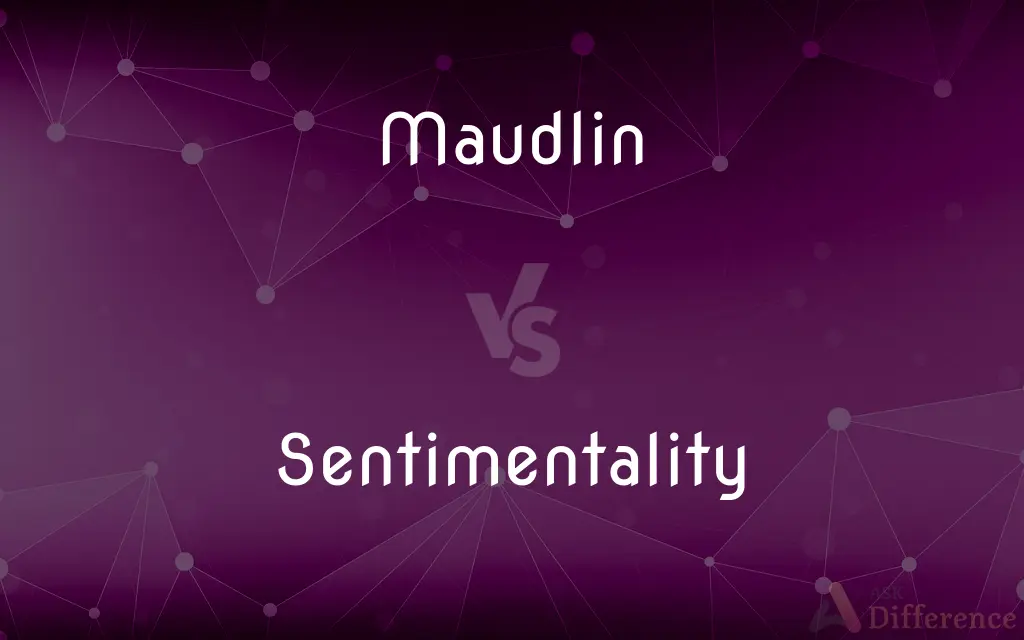Maudlin vs. Sentimentality — What's the Difference?
By Urooj Arif & Fiza Rafique — Updated on May 2, 2024
Maudlin describes an excessively sentimental expression often accompanied by tears, usually seen as overly emotional; sentimentality refers to the quality of being led by feelings more than reason, often idealizing emotional responses.

Difference Between Maudlin and Sentimentality
Table of Contents
ADVERTISEMENT
Key Differences
Maudlin typically refers to an overly sentimental behavior that is often tearful and viewed as excessively emotional or self-pitying. Whereas sentimentality involves an emotional disposition that emphasizes feelings over rationality, often leading to an idealized or romanticized view of events.
Maudlin behavior can sometimes be seen as insincere or superficial because it is so exaggerated and outwardly emotional. On the other hand, sentimentality, while also criticized for being excessive, is usually perceived as a genuine though idealistic emotional response.
Maudlin comes from a specific historical literary reference to Mary Magdalene, often depicted as weeping; it implies a sort of public, performative sadness. In contrast, sentimentality doesn't necessarily have a negative connotation and is broader, applying to both positive and negative emotions.
Maudlin is often triggered by minor or trivial matters, causing the individual to cry or become overly emotional about something relatively unimportant. Conversely, sentimentality is more about a consistent emotional perspective that sees the world through a lens of personal feelings and values, regardless of the situation's triviality.
In cultural contexts, maudlin is less frequently used and typically carries a critical tone, suggesting inappropriate or excessive displays of emotion. Sentimentality, however, is common in discussions about art, literature, and film, where it can either be a point of critique or praise, depending on the observer's values.
ADVERTISEMENT
Comparison Chart
Definition
Excessively tearful and emotional
Led by emotions over rational thought
Connotation
Often negative, implying insincerity
Can be positive or negative
Origin
Derives from Mary Magdalene
Broad application in emotional contexts
Emotional Trigger
Triggered by trivial issues
A general emotional perspective
Cultural Perception
Critically viewed in modern use
Varies widely, context-dependent
Compare with Definitions
Maudlin
Can be derisively characterized as unnecessarily weepy.
The character's maudlin behavior made the play less believable.
Sentimentality
May lead to an idealized view of reality.
The film's sentimentality painted an unrealistically positive picture of the era.
Maudlin
Often associated with self-pity or trivial complaints.
The movie's maudlin ending didn't resonate with the audience.
Sentimentality
Emphasizes emotions over rational analysis.
The book's sentimentality appealed to his romantic side.
Maudlin
Typically viewed as exaggerated and insincere.
Her maudlin speech seemed out of place at the formal event.
Sentimentality
Reflects a deeply emotional state or disposition.
Her sentimentality is evident in her compassionate actions.
Maudlin
Overly sentimental to the point of tears.
He became maudlin after only one glass of wine.
Sentimentality
Often found in personal and artistic expressions.
Her poetry is known for its deep sentimentality.
Maudlin
Has historical literary associations with Mary Magdalene.
The portrayal of Mary Magdalene as maudlin influenced many artworks.
Sentimentality
Can be seen as a positive quality, evoking empathy.
His sentimentality made him particularly empathetic towards others' hardships.
Maudlin
Effusively sad or full of self-pity; extremely sentimental
"displayed an almost maudlin concern for the welfare of animals" (Aldous Huxley).
Sentimentality
Sentimentality originally indicated the reliance on feelings as a guide to truth, but in current usage the term commonly connotes a reliance on shallow, uncomplicated emotions at the expense of reason.Sentimentalism in philosophy is a view in meta-ethics according to which morality is somehow grounded in moral sentiments or emotions. Sentimentalism in literature refers to techniques a writer employs to induce a tender emotional response disproportionate to the situation at hand (and thus to substitute heightened and generally uncritical feeling for normal ethical and intellectual judgments).
Maudlin
The Magdalene; Mary Magdalene.
Sentimentality
The quality or condition of being sentimental, especially excessively or extravagantly so.
Maudlin
(historical) Either of two aromatic plants, costmary or sweet yarrow.
Sentimentality
A sentimental idea or an expression of it.
Maudlin
(obsolete) A Magdalene house; a brothel.
Sentimentality
An act or state of being sentimental.
Maudlin
Affectionate or sentimental in an effusive, tearful, or foolish manner, especially because of drunkenness.
Sentimentality
The quality or state of being sentimental.
Maudlin
Extravagantly or excessively sentimental; mawkish, self-pitying.
Sentimentality
Falsely emotional in a maudlin way
Maudlin
(obsolete) Tearful, lachrymose.
Sentimentality
Extravagant or affected feeling or emotion
Maudlin
Tearful; easily moved to tears; exciting to tears; excessively sentimental; weak and silly.
Maudlin
Drunk, or somewhat drunk; fuddled; given to drunkenness.
Maudlin Clarence in his malmsey butt.
Maudlin
An aromatic composite herb, the costmary; also, the South European Achillea Ageratum, a kind of yarrow.
Maudlin
Effusively or insincerely emotional;
A bathetic novel
Maudlin expressons of sympathy
Mushy effusiveness
A schmaltzy song
Sentimental soap operas
Slushy poetry
Common Curiosities
Can maudlin behavior be considered genuine?
Maudlin behavior is typically perceived as exaggerated and possibly insincere, unlike genuine emotional expressions.
How does the origin of "maudlin" influence its meaning?
The term "maudlin" derives from depictions of Mary Magdalene as excessively weepy, influencing its connotation of overdone emotionality.
How does culture influence the reception of maudlin and sentimental expressions?
Cultural values and norms significantly influence whether such expressions are accepted or ridiculed.
Is sentimentality always a negative trait?
No, sentimentality can be viewed either positively or negatively, depending on the context and the observer's perspective.
Why might someone criticize maudlin behavior?
Maudlin behavior might be criticized for being overly dramatic and not reflective of genuine emotional depth.
Can a work of art be both maudlin and sentimental?
Yes, a work of art can exhibit both characteristics, being both overly tearful (maudlin) and emotionally driven (sentimental).
What is the main difference between maudlin and sentimentality?
Maudlin specifically refers to being tearfully and excessively sentimental, often seen as insincere, whereas sentimentality is a broader emotional disposition that values feelings over rational thought.
In what types of literature would you commonly find sentimentality?
Sentimentality is often found in romantic, dramatic, or nostalgic works of literature and art.
How do maudlin and sentimentality affect perception in social situations?
Maudlin behavior can lead to negative judgments about sincerity, while sentimentality might make someone seem more empathetic or, alternatively, overly idealistic.
What advice would you give someone who is often told they are maudlin or too sentimental?
Reflect on the authenticity of your emotional expressions and consider if they are appropriate for the situation, aiming for a balance that feels true to yourself yet mindful of others' perceptions.
Share Your Discovery

Previous Comparison
Rambler vs. Wanderer
Next Comparison
Hearth vs. MantelAuthor Spotlight
Written by
Urooj ArifUrooj is a skilled content writer at Ask Difference, known for her exceptional ability to simplify complex topics into engaging and informative content. With a passion for research and a flair for clear, concise writing, she consistently delivers articles that resonate with our diverse audience.
Co-written by
Fiza RafiqueFiza Rafique is a skilled content writer at AskDifference.com, where she meticulously refines and enhances written pieces. Drawing from her vast editorial expertise, Fiza ensures clarity, accuracy, and precision in every article. Passionate about language, she continually seeks to elevate the quality of content for readers worldwide.
















































